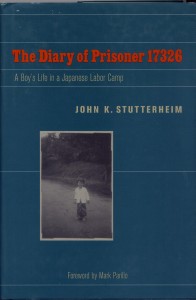Stutterheim Diary
Stutterheim Diary
The Stutterheim diary is a remarkable, vivid account of the suffering of European teenage boys during the Japanese Occupation of Java.
The Diary of Prisoner 17326 by John K. Stutterheim, Fordham University Press , New York, 2010.
John Stutterheim was born in 1928 , and therefore was fourteen years old when he and his mother and younger brother were ordered out of their home in Malang, Eastern Java, by the invading Japanese army. Thus began their internment, taking them to Surabaja, and Solo. Eventually John was ordered to leave his mother and go to a boy’s camp, where he had the presence of mind, and tenacity to maintain a diary, complete with sketches. This book therefore gives a rare, detailed glimpse of the horrors experienced by boys in those camps and moreover provides information about internment in eastern and central Java. This book is a good read .
The Stutterheim Diary casts an invaluable light on the plight of the boy prisoners of the Japanese during the second world war
Relevance to Tjideng Reunion
I avoided the fate that befell John, but after about 1944 I became conscious of the future that awaited me upon turning ten years old. Unbeknownst to me my mother had lied about my age, because according to the Tjihapit camp register, undoubtedly using information provided my my mother, I was born in 1939. She managed to retain throughout the internment period my South African birth certificate which stated otherwise. She had run a risk. During our time in that camp the emotional departure of boys who had turned ten years old became more and more frequent. For years after the war I suffered nightmares about the fate that never overtook me.
We all experienced difficulties integrating , or in John’s case re-integrating into school life after the war. I began my formal education at age eight, in kindergarten to begin with, to learn English. John’s education was interrupted half way through Grade eight, and when he entered high school for the first time he was nineteen, joining a class of thirteen-year-olds. He became a medical doctor.
All of us camp children emerged from the war scarred, some more than others. John writes “Anyone who experiences as a teenager the things described in this book will have a mental scar for life”. Over the years I have come to know several people who can attest to that statement, and it is only now looking back over the vast majority of my lifetime that I can begin to fathom how the war influenced my path through life. We all experienced post traumatic stress , but that was as yet an unrecognized condition. You sank or swam entirely dependent on a combination of luck and your own resources.
Other issues
In his epilogue, John dwells on the above and some of other wider issues related to war crimes. The medical experiments carried out by unit 731, the brainchild of Dr. Shiro Ishii evokes his understandable rage.

Leave a Reply